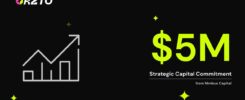MIAMI BEACH — When Shane Coplan launched Polymarket, he didn’t have a team or much funding. All he had was a blockchain, a powerful conviction, and a laptop.
“I’m a solo founder. I literally started with almost no money,” Coplan said during a talk at Cantor Fitzgerald’s Cryptocurrency, AI and Blockchain Conference in Miami Beach on Wednesday. “The great thing about blockchain technology is that it allows some kid in his bedroom — or their bathroom, or their office, or whatever — to go out and innovate and try out financial applications.”
He credited the open nature of blockchain technology with allowing him to create an efficient global market without traditional institutional support. “The barrier to entry in building something innovative in traditional fintech is prohibitive for anyone trying to build something new, who is young and doesn’t have a lot of capital and doesn’t have a lot of time,” he said.
Polymarket, which launched in 2020, allows users to trade the probability of real-world outcomes — from elections to Fed decisions to celebrity gossip. The platform does not run on polling data or expert forecasts. Instead, it allows the market to determine probabilities.
“When people are watching an election, or an election that has implications for their livelihood, they want to know who is going to win,” Coplan said. “Polls are fine, there’s a random group of people…but they’re constantly leaning one way or another. It’s just noise.”
He believes markets offer something more honest: a price backed by conviction and risk.
“We have this cycle where whenever there’s a big election, everyone flocks to Polymarket, everyone checks it. Then everyone comes along and makes up a conspiracy theory about why it’s not accurate,” he said. “If Cuomo is trading at five cents to make a dollar…and if it’s actually worth 40 or 50 cents and trading at five cents, you should buy it. You should put your money where your mouth is.”
Every trade on Polymarket is peer-to-peer, and prices reflect collective faith. “It doesn’t depend on how much money is allocated to each candidate,” Coplan explained. “At any given moment, there are yeses to the stock…and if you look at the order book, there are offers and calls.
Whatever the midpoint is, this is a possibility. This is the present value of winning $1 if true.
Beyond politics, Coplan sees broader potential: prediction markets as decision-making tools, even in public policy.
“You could say, ‘What’s the probability of Cuomo winning if Sliwa doesn’t withdraw, and what’s the probability of him winning if he withdraws?’ He said. “From markets, if you structure them properly, you can help inform decision-making in society on an unprecedented scale.”
Coplan also believes Polymarket can compete with legacy betting platforms by offering something traditional sportsbooks can’t: fairness.
“If you’re betting or trading the outcome of a game… there’s a monopoly on pricing. You’re trading against the house every time,” he said. “They can set the rates they want. If you make any money, they can block you. They can rate you and give you worse rates or cap you.”
“This is America. You see something that is inefficient and manipulative against the consumer — when it’s a financial market, but it’s positioned as an entertainment product designed for you to lose — you can’t go and complain when the financial market alternatives come along.”
Coplan sees Polymarket eventually playing a role in sectors like insurance, where consumers often face bundled services and higher premiums.
“A lot of times, if you’re laying off employees or trying to hedge against some kind of exotic risk, you approach a company that has a sales team, a risk department… and you usually end up paying very poor rates,” he said. “What’s great about Polymarket is that you can see people creating a Polymarket for the same type of risk… risk pricing people can provide liquidity. Good sales people can go and enable them to hedge those risks.”
He also touched on the role that AI agents may soon play in trading markets. “You see a lot of people experimenting with AI agents that can measure sentiment, monitor the news and basically form their own opinions… When they see a mispricing, they can try to correct the market,” he said. “Even if there is very little liquidity, or little liquidity support, those proxies will go away, and people will compete to build the most accurate proxies.”
The long tail of niche markets — anything related to uncertainty — is where a lot of Polymarket’s potential lies, Coplan said. “Will it increase the volume of information? No. But will it open up a new form of information? Yes,” he said. “Market multiple probabilities — the percentage chance of something happening — can extend to a much larger set of opportunities.”
As Polymarket prepares to expand its U.S. footprint and onboard new users through a beta exchange, Coplan remains focused on staying ahead of legacy institutions — and building a platform that delivers on the original promise of blockchain.
“We’re just trying to build the best product,” he said. “Something people love to use, where your opinion actually matters.”




